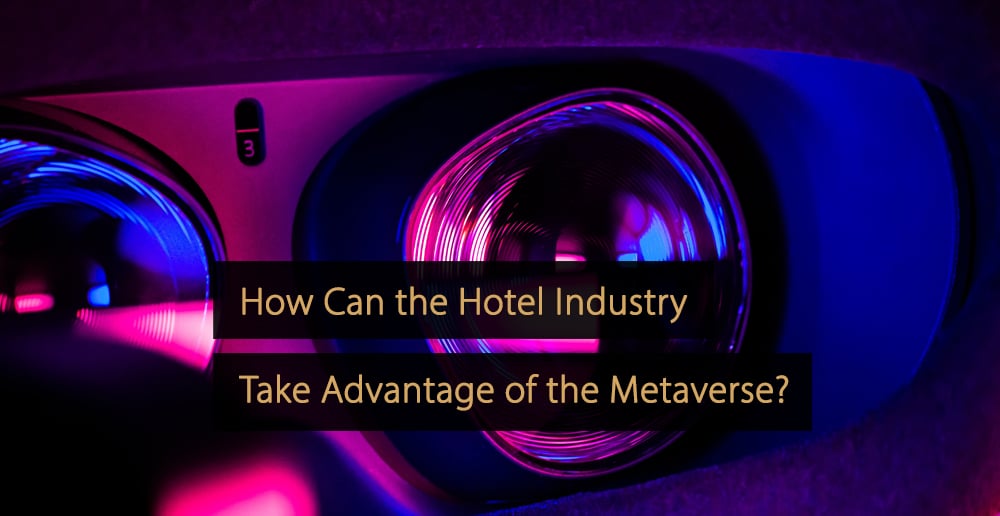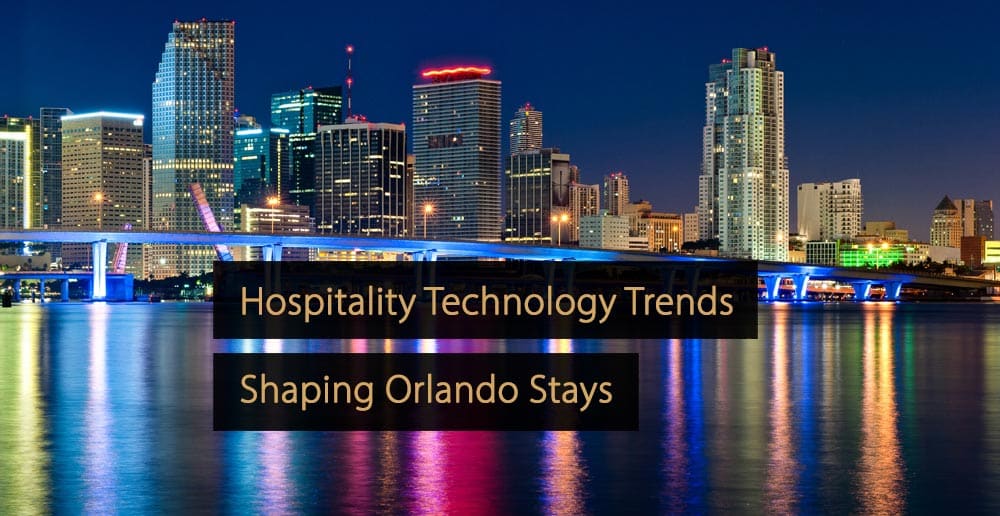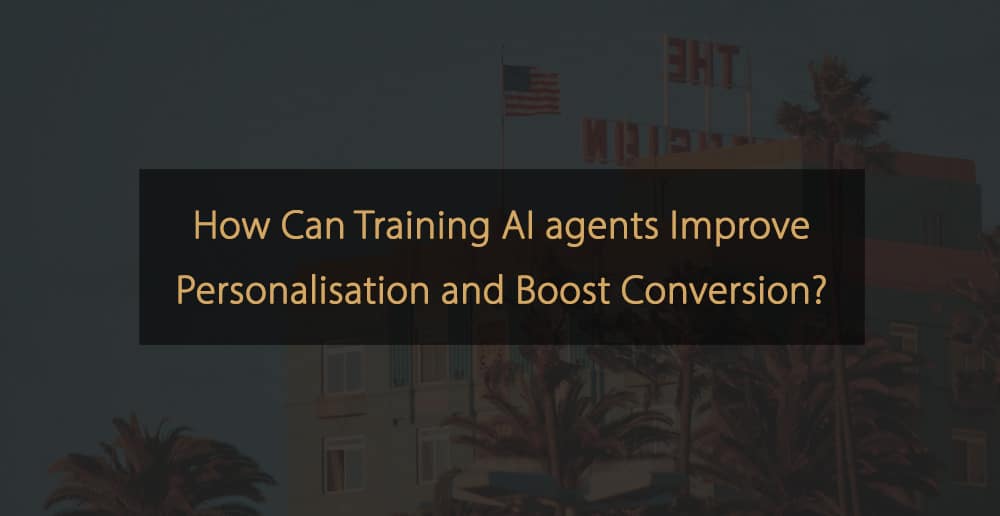The concept of the metaverse hotel has been discussed a lot recently, and for a good reason, as the technology to make the metaverse a reality becomes more widespread and accessible. In this article, you can discover more about the metaverse and the various ways hotels can benefit from it in the future.
Table of Contents:
- What is the Metaverse?
- How Can Businesses Use the Metaverse?
- What is the Difference Between Metaverse and Virtual Reality?
- What is the Hotel Industry?
- How Can Hotels Benefit From the Metaverse?
- Augmented Reality as a Means for Metaverse Hotel Strategies
- Hotel Metaverse Access with Special Devices
- What Are Some Metaverse Examples That Hotels Can Use?
- Blockchain Technology and the Hospitality Metaverse
- Examples of Hotel Metaverse Strategies
- The Hospitality Metaverse and Other Hospitality Tech Trends
- Virtual Reality and the Hospitality Metaverse
- The Hospitality Metaverse and Artificial Intelligence
What is the Metaverse?
The metaverse is a term used to describe a digital or virtual world that allows for social interactions, often through an avatar. The leading technologies associated with the metaverse are virtual reality and augmented reality, but video game devices and blockchain technology could also play a role.
When businesses, marketers, and technology experts speak about the metaverse, they envision a digital environment where people can interact with people from all over the world. These social interactions in a digital sphere could also provide opportunities for e-commerce or guest experiences, including creating metaverse hotels.
Video: Metaverse Explained
Would you like to learn more about the Metaverse? The article “Metaverse Guide; Understanding The Basics Will Open Up a New World” provides more in-depth information about this new “universe”. The website also provides a list of Metaverse blog’s specializing in this subject.
How Can Businesses Use the Metaverse?
Businesses already utilize digital technology to bridge physical gaps between themselves and their customers. For example, online retail allows for purchases to be completed over the internet, while mobile apps allow businesses and their customers to interact remotely in numerous ways. The metaverse can be viewed as the next technological leap.
Using virtual or augmented reality devices, the digital shopping experience could be taken to the next level, blending the benefits of online shopping with the knowledge of shopping in the real world. Buyers could use their avatars to view products up close or experience what they wish to buy before completing their purchase.
The same is true for businesses that exist to provide experiences. We have already seen examples of virtual concerts taking place in games like Fortnite, or hologram technology, allowing concertgoers to experience a performance from a deceased artist. A metaverse hotel, meanwhile, can provide a digital travel experience.
What is the Difference Between Metaverse and Virtual Reality?
Virtual reality is already an example of emerging hotel technology, with many properties offering virtual reality tours of their hotel rooms and social areas. So how does the metaverse differ from what already exists in terms of virtual reality experiences?
The fundamental difference between the metaverse and virtual reality is the level of interaction. People use their avatars to interact and experience new things in a shared digital space with other metaverse users in the metaverse. Technology is used to connect this experience to the person’s physical reality.
What is the Hotel Industry?
When discussing the concept of metaverse hotel implementation, it is vital to be precise about the hotel industry. In essence, this refers to the section of the service industry which centers around guest accommodation, lodgings, and all relevant related services or experiences.
Generally, when people refer to the hotel industry, they are referring to the industry encompassing hotels, resorts, motels, inns, bed and breakfast accommodations, hostels, holiday cottages, and other similar properties. You can learn more by reading our article, “Hotel Industry: Everything You Need to Know About Hotels!“.
How Can Hotels Benefit From the Metaverse?
The two main ways that hotels can benefit from the metaverse are by providing unique, virtual experiences to customers and offering complimentary metaverse experiences to enhance the more traditional guest experience that the hospitality industry offers. Hotels providing either of these options can be regarded as metaverse hotels.
With the former, the hotel could offer services that allow guests to meet and interact in a virtual environment, effectively offering elements of the travel experience without customers needing to travel physically. So, for example, people could use their avatars to carry out a business meeting in a virtual environment.
The virtual world experience could form part of a broader, more conventional travel experience with the latter. This could take many forms, but an example would be offering virtual reality experiences within the hotel, where children can interact in a digital environment entirely different from their real-world setting.
Augmented Reality as a Means for Metaverse Hotel Strategies
Metaverse hotel marketing can include the use of augmented reality. Augmented reality (AR) blends virtual reality and the physical world. An example would be the game Pokemon Go, where players “see” Pokemon creatures superimposed over an image of the real world on their mobile devices.
In the context of the hotel industry, augmented reality can have a range of applications. It can be used as a marketing tool to enhance a guest’s stay, providing helpful information, real-time translations of signs and menus, and entertainment or decorative elements.
Hotel Metaverse Access with Special Devices
To access the hotel metaverse, guests will need a digital device. While any device with a screen can theoretically give you a taste of the metaverse, VR can bring it to life. In this section, you’ll discover those devices.
Mobile Phones and Computers
A computer is one of the most common ways to access the metaverse. Most metaverse programs run on a computer, as they require quite a lot of processing power and can be too demanding for mobile devices.
However, some platforms may be run on your mobile phone, provided it has a powerful enough processor or a way to connect to your computer. A computer isn’t always the most user-friendly way to interact with the metaverse, but it’s a good option for many, as computers are much less expensive than VR technology.
VR Headsets
A VR headset is exactly what it sounds like a device that you wear over your head and face to interact with virtual reality. The display built into the device lets you see the virtual environments you’ll be interacting with. In contrast, the built-in earphones let you hear speech, environmental noise, and other sounds within the virtual environment.
While they have their roots in video gaming, VR headsets are now used for various other applications. Virtual meetings, conferences, product launches, and more can be conducted in VR. Guests wearing a VR headset can tour your virtual hotel or participate in virtual events there.
AR Data Glasses
AR glasses allow users to combine the virtual world with the real one. They consist of transparent screens worn over the user’s eyes, just like normal glasses. The screens can display information or images while the real world remains visible.
As well as providing a view of the real world, AR glasses are less bulky and more manageable than VR headsets. AR glasses have many potential applications in the hotel metaverse space. For example, guests wearing AR glasses could receive real-time information as they tour your hotel, such as translations or information on services and amenities.
MR Headsets
MR stands for mixed reality. It’s a way of combining technologies such as VR and AR into a single device, presenting the wearer with a digital overlay through which the real world is still visible. A mixed reality headset scans the wearer’s environment continually, feeding this information back into the device’s processors so that the digital overlay can be blended with what the wearer sees around them.
MR is still very much in its infancy, but the future applications for the hotel metaverse space are exciting. MR could be used to upsell guests on more luxurious rooms, illustrate services offered at the hotel’s amenities, or enhance their stay.
What Are Some Metaverse Examples That Hotels Can Use?
Although there are many different ideas of how a metaverse hotel can take shape or how virtual and augmented reality technology can be used to improve the experience for customers, the following are some of the most achievable examples of how this kind of hotel technology can take the industry forward in the years to come.
Enhancing the Booking Process and Hotel Tours Through the Metaverse
Virtual reality tours are among the most prominent emerging hotel marketing trends, helping to enhance the booking process, but the metaverse can take this a step further. For example, a digital avatar could allow a potential customer to perform a virtual walkthrough before deciding.
Using this avatar, the potential customer could walk through a metaverse hotel, which has been designed to look exactly like the real thing. This gives them a clear sense of how big each room is or what features they can expect if they upgrade. It may also be possible to ask employees occupying the metaverse.
Providing the Digital Environment for Virtual Celebrations
People often travel to hotels for celebrations, including birthdays and honeymoons, but this does mean they cannot physically share their experiences with people who do not travel with them. A metaverse hotel can change this by allowing guests to participate in virtual celebrations with people who are not physically present.
The COVID-19 pandemic helped push the adoption of digital communication tools, and the metaverse can still take this further. For instance, imagine a guest celebrating their birthday, and the hotel can place them in the metaverse as a surprise, with their friends and family also present in that same virtual world.
Upselling
The metaverse offers new ways to enhance revenue through upselling. It’s an excellent way to let guests explore upgraded rooms and different room options, get an idea of your hotel’s experiences, and explore your hotel’s services. Allowing guests to visualize different options often persuades them that the additional outlay is worth it.
For example, guests can explore a higher-end suite in the metaverse, check out the services at your hotel spa, or even see the dishes on your menu. This kind of visualization makes options less abstract and can make guests more likely to purchase them.
New Marketing Channels
The metaverse can also work for you as a marketing channel. Creating a hotel metaverse experience is a cost-effective way to bring your hotel to life for prospective guests, reaching markets that might otherwise have been inaccessible to you.
Because the metaverse’s users are largely young, it’s an excellent means of reaching Generation Z and Millennial customers who might not connect with your other marketing channels. Cultivating a metaverse presence lets these younger guests know that your hotel is interested in their business and that your establishment is tech-savvy and up-to-date.
Use a Hotel Digital Twin to Present Your Property
A digital twin is a direct representation of your hotel or resort that exists in the virtual world. The aim is to make your hotel’s digital twin similar to its real-world counterpart. Guests can explore this digital version of your hotel through VR technology, looking into the rooms they’ll be staying and visiting amenities like the restaurant, pool, or spa.
A digital twin can bring your hotel to life for guests in a way that still photos and even video can’t, offering them an immersive experience that will make staying with you more enticing.
Sell Rooms as NFTs
NFTs (non-fungible tokens) are unique digital tokens held on the blockchain. You can think of them as a kind of digital receipt. Although they’re frequently used to market digital art, these tokens can be attached to anything, from a piece of media, such as an image, to a real-world object.
This means you could allow guests to buy their hotel bookings as NFTs. Future applications for NFTs in the hotel space could be digital loyalty programs, souvenirs, or digital tickets for attractions or events near the hotel.
Blockchain Technology and the Hospitality Metaverse
Aside from the concept of metaverse hotels, blockchain technology is one of the other critical emerging technologies that those in the hospitality industry need to be aware of. This can be used in several ways to enhance the hospitality metaverse, such as making secure payments or confirming identities.
To learn about blockchain technology in greater detail and understand how hotels can use it, read “Blockchain Technology and Its Uses in the Hospitality Industry”.
Examples of Hotel Metaverse Strategies
Here are some examples of hotel metaverse use cases already deployed in the hotel industry.
CitizenM
The metaverse comprises digital realms that people can explore through VR. This has given rise to the concept of digital real estate. One example is Sandbox, a platform where users can trade virtual assets on the blockchain. Among these assets is LAND, a piece of digital real estate held on the Ethereum blockchain.
These LAND parcels can be traded among users or utilized as virtual destinations. CitizenM, a hotel group, is pioneering the use of LAND for virtual hotels and metaverse marketing. CitizenM intends to use its LAND to showcase its own NFTs, using these to fund the creation of a real-world hotel.
Millennium Hotels
Millennium Hotels and Resorts launched their own offering, M Social, in Decentraland. Decentraland is a browser-based metaverse platform that allows users to buy and sell parcels of digital real estate, allowing Millennium to open up a virtual hotel.
Modeled to resemble Millenium’s real-world M Social hotels, the virtual hotel lets guests explore and rent or buy space there. The virtual hotel even has a lobby space for guests to hold virtual events, such as performances or project launches. M Social creates a link between the real world and the metaverse, giving Millennium a new way to reach guests.
Video: Millennium Hotels and Resorts
RendezVerse
RendezVerse creates metaverse replicas of real-world hotels, which guests can use to hold virtual events such as conferences. Working with Atlantis and Marriott, RendezVerse offers a “metaverse-as-a-service” model that uses Web3 technology to fill a niche in the hotel marketing space.
RendezVerse aims to create a metaverse-based community of hotel owners, event organizers, and other hospitality and events providers to open up new ways of connecting and marketing online. By creating digital twins of iconic hotels and venues, RendezVerse offers attractive digital spaces for events of all kinds.
Video: The Virtual Hotel (in the Metaverse)
Hilton
The Hilton chain is collaborating with Niio Art, a digital art streaming service, to bring digital artwork to the walls of their hotels. Selected guestrooms and public spaces will display the artworks on digital screens for guests to admire.
As well as enjoying the art during their stays, guests can participate in NFT giveaways and gifted art streaming subscriptions, allowing them to appreciate the images in their homes. This is a new way for hotels to add value to their services and provide guests with something fresh.
Pinktada
Pinktada makes use of the blockchain to sell bookings via the blockchain. Instead of conventional bookings, Pinktada’s customers can buy RNTs (room night tokens). These can be exchanged for nights at a specific hotel or room.
RNT holders can also sell their RNTs for PinkCash, a type of digital store credit that can be used to buy another RNT in the future. Guests can also swap RNTs with other holders to stay at a different hotel or room. RNTs can also be gifted to other parties.
The Hospitality Metaverse and Other Hospitality Tech Trends
While the concept of metaverse hotels and the hospitality metaverse is essential to get to grips with, it is also vital that hotel owners understand other emerging technology trends in the industry, including voice search, robotics, recognition technology, the use of AI-powered chatbots, and more.
You can explore the latest technology trends within hospitality and find out why these trends have emerged by reading our article on the topic, “The Latest Technology Trends in the Hospitality Industry“.
Virtual Reality and the Hospitality Metaverse
Virtual reality technology is a fundamental part of the hospitality metaverse and the creation of a metaverse hotel. However, this technology should also be understood for its own merits. Indeed, through VR, it is possible to create a virtual booking process, offer virtual tours, provide virtual travel experiences, and more.
If you want to explore virtual reality technology within hotels and similar settings further, read through the “How Virtual Reality (VR) Can Enrich the Hospitality Industry” article.
The Hospitality Metaverse and Artificial Intelligence
Finally, artificial intelligence is another important technology that can be linked to the metaverse hotel concept. Much like virtual reality, however, this should also be viewed and understood as a separate technology trend and can be used to deliver in-person and online customer service and data analysis.
To delve deeper into the topic of artificial intelligence within hotels and other businesses and learn how to make the most of this technology, read “How to Use Artificial Intelligence in the Hospitality Industry”.
The metaverse concept will disrupt many industries in the years ahead, and the hotel industry is no different. A metaverse hotel offers plenty of potential, especially as hotels leverage virtual reality, augmented reality, and similar technology to provide space for memorable virtual interactions.
More Tips to Grow Your Business
Revfine.com is the leading knowledge platform for the hospitality and travel industry. Professionals use our insights, strategies, and actionable tips to get inspired, optimize revenue, innovate processes, and improve customer experience.Explore expert advice on management, marketing, revenue management, operations, software, and technology in our dedicated Hotel, Hospitality, and Travel & Tourism categories.
This article is written by:
Hi, I am Martijn Barten, founder of Revfine.com. With 20 years of experience in the hospitality industry, I specialize in optimizing revenue by combining revenue management with marketing strategies. I have successfully developed, implemented, and managed revenue management and marketing strategies for individual properties and multi-property portfolios.









Nice article about what the metaverse contains within the hotel industry. ! I am looking forward to finding more information about this topic.